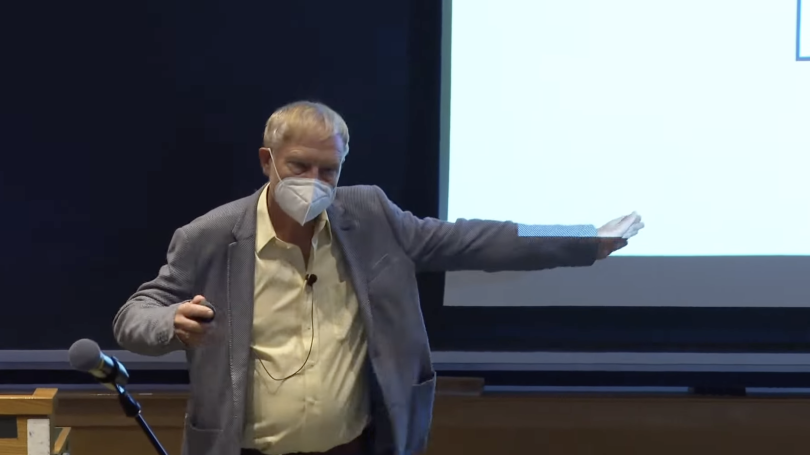
- Public Policy
- Leadership
- Funding
- News & Events
- About the Center
Back to Top Nav
Back to Top Nav
Back to Top Nav
Back to Top Nav
On Wednesday, October 13th, 2021, Sven Steinmo, a professor of political science at the University of Colorado, Boulder, convened with Dartmouth students and community members in Filene Auditorium for an event co-hosted by Dartmouth's Sociology Department and the Rockefeller Center.
For a decade, Steinmo was the Robert Schuman Professor at the European University Institute (EUI) in Florence, Italy as well as a Senior Research Fellow at Nuffield College, Oxford University. While in Europe, he conducted a series of cross-national experiments on how institutions shape individuals' behaviors. This research is the foundation of Steinmo's upcoming book Willing to Pay? A Reasonable Choice Approach and informed Wednesday's lecture.
Steinmo began his lecture with an anecdote from his time in Italy. One day while walking the streets of Florence, a car packed with a young family pulled up beside Steinmo and dropped their garbage onto the side of the street. Steinmo was shocked. Having lived in multiple countries, he felt confident that this was unique. "A Norwegian teenager, in the middle of a forest, in the middle of the night, would never throw garbage out the window of their car," Steinmo observed.
What could account for that variance? The standard answer for such cross-national differences in behavior, Steinmo found, was 'ah, it's just their culture.' To Steinmo, this was unsatisfying. He wanted to understand experimentally whether some groups are less rule-following than others. Steinmo set out to answer this question by examining social behavior across countries while controlling for governmental and social institutions.
One of the problems with inference in political science, Steinmo says, is its reliance on case research. Using cases, political scientists can finesse events so that they fit their theories, but are vulnerable to the critique that, because such cases can never control for all confounding variables, their results are biased. However, Steinmo emphasizes that a "new social science, behavioral science, has been doing experiments [to generate causal insights]." This burgeoning field of research inspired him to set up the cross-national laboratory experiments that form the backbone of his new book.
To measure individual behavior in these experiments, Steinmo focused on tax-compliance rates. In short, participants would play a game where they could win money. After their winnings were announced, these individuals would be asked to report their winnings for taxation. Steinmo measured the honesty with which participants reported these winnings, with a lower level of disclosure corresponding to higher rates of tax evasion.
His findings are provocative: those from the United Kingdom tended to cheat the most, relative to peers in Italy, Sweden, and the United States. Those in the United States had tax compliance rates in line with those from Sweden. Beyond that, women were more honest in disclosing their winnings than men in every country that Steinmo surveyed. Why is this the case? One explanatory factor that Steinmo identifies is that individuals from these countries have different perceptions of how much their peers are paying in tax. Indeed, Steinmo finds a positive correlation between belief that others are not paying tax and tax evasion by the individual.
Explaining why, precisely, the supposedly wayward Italians had a higher base propensity to pay tax than those in the United Kingdom, Steinmo said "[the Italians] do follow rules, it's just that the rules are not the same as the laws." In other words, Italians have a robust code of social behavior, but often this behavior is disconnected from the laws promoted by their government.
Building off this point, Steinmo argues that "when the government promulgates rules that no one is expected to follow, trust in the state declines." This story, he argues, has a lot to say about the United States. "We have a society that is breaking down because people think that the state steals from them," Steinmo emphasizes, pointing to tax evasion by prominent political figures such as former President Trump as examples. "I worry about our country because I think that the moral value of contributing to the public good is in decline."
Written by Ben Vagle '22, Rockefeller Center Student Assistant for Public Programs